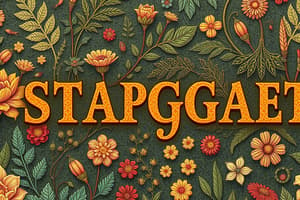Podcast
Questions and Answers
What is the main purpose of LGBTQ+ pride events?
What is the main purpose of LGBTQ+ pride events?
The main purpose is to celebrate self-affirmation and identities without fear of discrimination.
When did the history of LGBTQ+ pride events begin?
When did the history of LGBTQ+ pride events begin?
The history dates back to the late 1960s when activists marched through New York City demanding equal rights.
Why are pride events held during June in many locations around the world?
Why are pride events held during June in many locations around the world?
June is recognized as LGBTQ+ pride month.
What message does the LGBTQ+ community convey by participating in pride events?
What message does the LGBTQ+ community convey by participating in pride events?
What significance do pride events hold for LGBTQ+ individuals?
What significance do pride events hold for LGBTQ+ individuals?
How have pride events evolved over time?
How have pride events evolved over time?
What are some common variations of LGBTQ+ pride events?
What are some common variations of LGBTQ+ pride events?
Where does the largest pride celebration in the world take place annually?
Where does the largest pride celebration in the world take place annually?
What types of activities are typically featured in pride parades?
What types of activities are typically featured in pride parades?
What is the purpose of conferences and workshops held during pride events?
What is the purpose of conferences and workshops held during pride events?
How did virtual pride events during the COVID-19 pandemic impact the LGBTQ+ community?
How did virtual pride events during the COVID-19 pandemic impact the LGBTQ+ community?
What role do LGBTQ+ pride events play in society according to the text?
What role do LGBTQ+ pride events play in society according to the text?
Flashcards are hidden until you start studying
Study Notes
LGBTQ+ Pride Events
LGBTQ+ pride events have become an essential part of modern culture, celebrating the diversity and achievements of individuals who identify as lesbian, gay, bisexual, transgender, queer, questioning, intersex, nonbinary, or another sexual orientation or gender identity. These events are held in various locations around the world throughout the year, often during June which is recognized as LGBTQ+ pride month. Here's what you need to know about these important gatherings:
Background and History
The history of LGBTQ+ pride events dates back to the late 1960s when activists marched through New York City demanding equal rights. This march marked the beginning of the Gay Liberation Movement and would ultimately lead to the first official LGBTQ+ pride parade in Chicago just one year later. Since then, pride events have grown in number, scope, and significance, with many cities hosting their own versions of the event.
Purpose and Significance
Pride events serve multiple purposes. They are celebrations of self-affirmation where LGBTQ+ people can connect with others like them, support each other, and celebrate their identities without fear of discrimination or judgement. Pride events also raise visibility and awareness, both within the community and among allies outside it. By making their presence known, the LGBTQ+ community sends a clear message that they are here, they will be heard, and their voices matter.
Types of Pride Events
There are several types of pride events that cater to different aspects of the LGBTQ+ community or specific groups within it. Some common variations include:
-
Parades: These public demonstrations feature colorful floats, live entertainment, and participants wearing bright costumes to showcase their vibrant community spirit.
-
Festivals and Concerts: Many cities host festivals and concerts featuring performers from across the LGBTQ+ spectrum, offering a platform for artists who may not otherwise get mainstream exposure.
-
Conferences and Workshops: Educational seminars and workshops are held to address issues relevant to the LGBTQ+ community, such as navigating legal challenges, dealing with workplace discrimination, or understanding intersectional struggles faced by those belonging to more than one marginalized group.
-
Awards Ceremonies: Some pride events honor community members for their contributions to advancing LGBTQ+ rights and acceptance.
International Reach
While many countries still face challenges related to LGBTQ+ rights, pride events have spread worldwide, highlighting the growing global recognition of the importance of inclusion. For example, the largest pride celebration in the world takes place annually in Sao Paulo, Brazil, attracting over 3 million attendees and showcasing the city's commitment to supporting its LGBTQ+ population. However, even in places where there might be a lack of formal pride events, local communities find ways to organize unofficial gatherings based on cultural norms and traditions.
Online Celebrations
During the COVID-19 pandemic, virtual pride events were organized online due to lockdown restrictions. While these events could not replace the physical experiences offered by traditional parades or gatherings, they allowed people to connect in new ways and celebrated the resilience of the LGBTQ+ community. This innovation has expanded the reach of pride events beyond geographical limitations.
In conclusion, LGBTQ+ pride events are more than mere celebrations; they are crucial moments of solidarity, education, and advocacy. As we continue to move towards a more inclusive society, these events will likely play an increasingly significant role in shaping our collective understanding and appreciation of the diverse array of human experience.
Studying That Suits You
Use AI to generate personalized quizzes and flashcards to suit your learning preferences.




